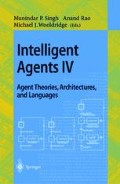Abstract
Incorporating coalition formation algorithms into agent systems shall be advantageous due to the consequent increase in the overall quality of task performance. Coalition formation was addressed in game theory, however the game theoretic approach is centralized and computationally intractable. Recent work in DAI has resulted in distributed algorithms with computational tractability. This paper addresses the implementation of distributed coalition formation algorithms within a real-world multi-agent system. We present the problems that arise when attempting to utilize the theoretical coalition formation algorithms for a real-world system, demonstrate how some of their restrictive assumptions can be relaxed, and discuss the resulting benefits. In addition, we analyze the modifications, the complexity and the quality of the cooperation mechanisms. The task domain of our multi-agent system is information gathering, filtering and decision support within the WWW.
This material is based upon work supported in part by ARPA Grant #F33615-93-1-1330, by ONR Grant #N00014-96-1-1222, and by NSF Grant #IRI-9508191.
Preview
Unable to display preview. Download preview PDF.
References
Robert Armstrong, Dayne Freitag, Thorsten Joachims, and Tom Mitchell. Webwatcher: A learning apprentice for the world wide web. In Proceedings of AAAI Spring Symposium on Information Gatheringfrom HeterogenousDistributed Environments, 1995.
R. Davis and R. G. Smith. Negotiation as a metaphor for distributed problem solving. Artificial Intelligence, 20(1):63–109, January 1983.
K. Decker, K. Sycara, and M. Williamson. Middle-agents for the intemet. In Proceeding of IJCAI-97, Nagoya, Japan, 1997.
Oren Etzioni and Daniel Weld. A softbot-based interface to the intemet. Communications of the ACM, 37(7), July 1994.
J. C. Harsanyi. Rational Behavior and Bargaining Equilibrium in Games and Social Situations. Cambridge University Press, 1977.
S. P. Ketchpel. Forming coalitions in the face of uncertain rewards. In Proc. of AAAI94, pages 414–419, Seattle, Washington, 1994.
D. Kuokka and L. Harada. On using KQML for matchmaking. In Proceedings of the First International Conference on Multi-Agent Systems, pages 239–245, San Francisco, June 1995. AAAI Press.
K. Lang. Learning to filter netnews. In Proceedings of the Machine Learning Conference 1995, 1995.
P. Maes. Agents that reduce work and information overload. Communications of the ACM, 37(7):31–40,1994.
M. Nodine and A. Unruh. Facilitating open communication in agent systems: the infosleuth infrastructure. In this volume.
A. Rapoport. N-Person Game Theory. University of Michigan, 1970.
T. W. Sandholm and V R. Lesser. Coalition formation among bounded rational agents. In Proc. of IJCAI-95, pages 662–669, Montrèal, 1995.
O. Shehory and S. Kraus. Formation of overlapping coalitions for precedence-ordered task-execution among autonomous agents. In Proc. of ICMAS-96, pages 330–337, Kyoto, Japan, 1996.
K. Sycara, K. Decker, A. Pannu, and M. Williamson. Designing behaviors for information agents. In Proceeding of Agents-97, pages 404–412, Los Angeles, 1997.
K. Sycara, K. Decker, A. Pannu, M. Williamson, and D. Zeng. Distributed intelligent agents. IEEE Expert-Inteligent Systems and Their Applications, 11(6):36–45, 1996.
K. Sycara and D. Zeng. Coordination of multiple intelligent software agents. International Journal of Intelligent and Cooperative Information Systems, 1996.
M. P. Wellman. A market-oriented programming environment and its application to distributed multicommodity flow problems. Journal of Artificial Intelligence Research, l:1–23, 1993.
M. Williamson, K. Decker, and K. Sycara. Unified information and control flow in hierarchical task networks. In Proceedings of the AAAI-96 workshop on Theories of Planning, Action, and Control, 1996.
G. Zlotkin and J. S. Rosenschein. Coalition, cryptography, and stability: Mechanisms for coalition formation in task oriented domains. In Proc. of AAAl94, pages 432–137, Seattle, Washington, 1994.
Author information
Authors and Affiliations
Editor information
Rights and permissions
Copyright information
© 1998 Springer-Verlag Berlin Heidelberg
About this paper
Cite this paper
Shehory, O.M., Sycara, K., Jha, S. (1998). Multi-agent coordination through coalition formation. In: Singh, M.P., Rao, A., Wooldridge, M.J. (eds) Intelligent Agents IV Agent Theories, Architectures, and Languages. ATAL 1997. Lecture Notes in Computer Science, vol 1365. Springer, Berlin, Heidelberg. https://doi.org/10.1007/BFb0026756
Download citation
DOI: https://doi.org/10.1007/BFb0026756
Published:
Publisher Name: Springer, Berlin, Heidelberg
Print ISBN: 978-3-540-64162-9
Online ISBN: 978-3-540-69696-4
eBook Packages: Springer Book Archive

